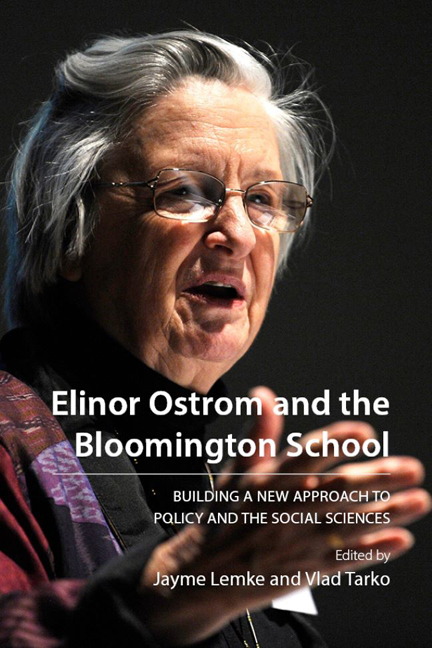Book contents
- Frontmatter
- Contents
- Acknowledgements
- Contributors
- 1 Introduction: the Bloomington school in context
- 2 Public choice theory: reuniting Virginia and Bloomington
- 3 New institutional economics: building from shared foundations
- 4 Elinor Ostrom as behavioral economist
- 5 New economic sociology and the Ostroms: a combined approach
- 6 Foundations of social order: the Ostroms and John Searle
- 7 Environmental policy from a self-governance perspective
- 8 Learning from the socialist calculation debate: is efficiency in public economics possible?
- 9 Public administration from “intellectual crisis” to contemporary “governance theory”
- 10 Rethinking federalism: social order through evolution or design?
- References
- Index
10 - Rethinking federalism: social order through evolution or design?
Published online by Cambridge University Press: 21 December 2023
- Frontmatter
- Contents
- Acknowledgements
- Contributors
- 1 Introduction: the Bloomington school in context
- 2 Public choice theory: reuniting Virginia and Bloomington
- 3 New institutional economics: building from shared foundations
- 4 Elinor Ostrom as behavioral economist
- 5 New economic sociology and the Ostroms: a combined approach
- 6 Foundations of social order: the Ostroms and John Searle
- 7 Environmental policy from a self-governance perspective
- 8 Learning from the socialist calculation debate: is efficiency in public economics possible?
- 9 Public administration from “intellectual crisis” to contemporary “governance theory”
- 10 Rethinking federalism: social order through evolution or design?
- References
- Index
Summary
The joint work of Elinor and Vincent Ostrom sought to address the possibility for individuals to establish a set of institutional conditions that would allow them to self-govern, rather than to be governed. Fundamental to their analysis was the idea that institutions are not only an artifact of deliberate human choice, but also that institutions facilitate learning about the behavior of individuals within society. Human beings must craft institutions in order to create reliable expectations for peaceful and productive interaction. In so doing, they are able to learn about the behavior of individuals within a set of institutions. Yet, individuals do not passively respond to their own constraints: they also learn how to better utilize those constraints for their own betterment, using their own particular and tacit knowledge. As a result, learning gives rise to the possibility for a greater variety of human behavior, the possibility of which can generate social instability. The role of institutions, then, in an Ostromian framework, is to order such adaptive human potential in such a way as to create reliable expectations about how others will behave and adapt to changing circumstances of time and place. Reflection and choice occurs on the margin with regard to institutional change. Individuals are grounded and shaped by the institutional framework within which they interact, but are nonetheless artisans that both tinker and adapt to the institutions that are the artifacts of their creation.
The particular focus of this chapter will be to analyze institutional change from an Ostromian perspective by analyzing the relationship between selfgovernance, polycentricity, and federalism. Throughout the work of Elinor Ostrom and Vincent Ostrom, there exist two consistent themes regarding the importance of federalism for polycentric governance. First, the Ostroms emphasized that the institutional conditions of federalism are a human artifact, based upon choice and deliberation. However, given their emphasis on processes of learning among human beings, this second theme suggests, as I argue in this chapter, a bi-directionality in institutional analysis. Although federalism and polycentric governance may be based on deliberate choice, such an institutional framework facilitates learning and the adaptive potential of human beings, leading to unintended innovative institutional changes to reinforce social cooperation between individuals.
- Type
- Chapter
- Information
- Elinor Ostrom and the Bloomington SchoolBuilding a New Approach to Policy and the Social Sciences, pp. 153 - 170Publisher: Agenda PublishingPrint publication year: 2021



